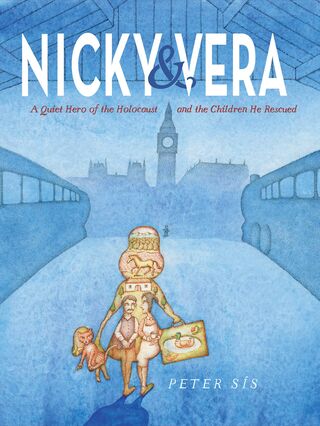Bias
Review of a Children’s Book on the Holocaust by Peter Sis
An inspiring book about the importance of standing up to racism.
Posted January 26, 2021

Is six too young for a story about the Holocaust? I would have said yes, but having read Peter Sis’ Nicky and Vera: A Quiet Hero of the Holocaust and the Children He Rescued, I’ve changed my mind, with some important caveats.
The Nicky of the title is Nicholas Winton, an Englishman who took remarkable risks, made big sacrifices, and devised creative schemes to rescue close to 700 Czechoslovakian children from almost certain death in the Holocaust. Once his rescue mission was over, Mr. Winton returned to his quiet life in England, and didn’t mention his heroic work again until many decades later, when his wife discovered some records in a box in the attic.
The Vera named in the book’s title is Vera Gissing, one of the children Nicky rescued, around whose life the story revolves. Vera Gissing has written about her life and experiences, including in her memoir, Pearls of Childhood.
The illustrations in Nicky & Vera are filled with imagination and possibility. They are thought-provoking, surprising, and delightful, the kind of pictures that will motivate children to take up pencils, paintbrushes, and paper. And the story: It is both heartbreaking and encouraging, inspiring a full range of emotions, in the way of the best children’s stories. In spite of being set against the backdrop of the Holocaust, Nicky & Vera is positive and hopeful in tone and message. It left me with a reminder of the importance of each of us doing what we can, no matter how small or unconventional our best might be, to make the world a better place.
The United States Holocaust Memorial Museum recommends not starting Holocaust education until age 11, and not broaching the subject before age 8, but my reading of this book suggests that with careful parental guidance, Nicky & Vera could be a good book for a child as young as six, for these reasons:
- The story’s focus is on two people, Nicky and Vera, not on the horrors of the Holocaust;
- It shows the importance of inclusion and respect for diverse others;
- The storytelling is honest, straightforward, and gentle, with no horrific details;
- It provides models of courage, kindness, inclusivity, and resilience; Nicky is a man who sees a terrible injustice in progress, and who sets aside his own life for a time in order to save the children;
- There are moments of quiet humor. For example, “Vera was the Queen of the Cats;”
- It provides an excellent introduction to the history of the Holocaust for this age. You learn that the Holocaust is a bad thing that happened in Europe in the early 1940s, and that many people died, but little else;
- It leaves children with the positive message, so important at this challenging moment in history, that each person can contribute to making the world a better place, and that bystanders can be heroes if they take action.
I do have an important caveat about this book. When sharing Nicky & Vera with a child as young as six or seven, I’d want a parent or a close and loving caregiver present for the reading, whether the child reads it to the caregiver, or the caregiver reads it to the child. The adult should be careful not to read with too much emotion, or betray any of the horrific details of the historic event that was the Holocaust. Instead, they should be calm, and keep the emphasis on Nicky’s quiet heroism and Vera’s courage and resilience.
If your child asks tough questions about what was going on behind the scenes, be ready with reassurances, such as, “The Holocaust was truly dreadful, but it happened a long time ago in a place where the people in charge were very mean, and encouraged everyone to treat Jewish people and others very badly."
I originally completed my recommendation for a reassurance with, "We have laws against that now, and a lot of people working to keep us safe.” Upon reflection, triggered by a message from Kaki Trimble, I've changed my opinion on that. I think I'd complete the reassurance by saying something like, "It's very important that we pay attention, and stay ready to stand up for anyone we see being treated badly. You can always come to me if you're worried about that, and I will do everything I can to make sure the injustice is stopped."
For more ideas for talking to your child about this, see "How Should You Talk to Your Child About the Holocaust."
Parents can also build on Nicky & Vera, by helping their child think about ways they can be like Nicky, not rescuing kids from the Holocaust, but by being alert to any bullying or mistreatment they encounter in their school or other environments.
I found the book deeply satisfying on many levels. One of the ideas it introduces that has nothing to do with the Holocaust is the importance of nurturing children’s interest in learning. For example, in describing Nicky’s early life, Sis writes that at Nicky’s school, “It didn’t matter what the students were interested in, as long as they were interested in something.”
Marking International Holocaust Remembrance Day on January 27, Elizabeth Blair focused a piece for National Public Radio on this book, for which I did an interview.




